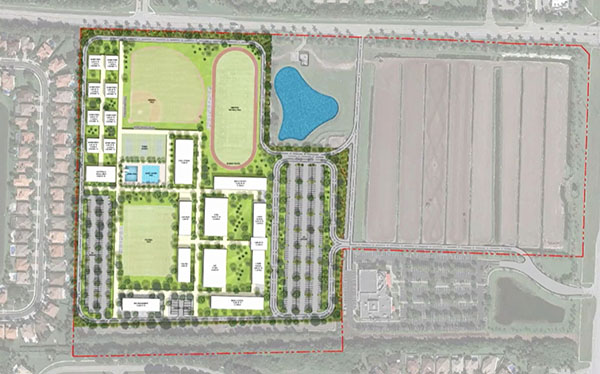It is about the last thing Wellington leaders pictured on land the village owns known as K-Park, but a private school whose origins date to 1850s London wants to build what it calls a “super-premium” K-12 school there.
North London Collegiate School envisions 1,500 to 1,700 students, mostly day students with perhaps 200 to 300 boarders, taught by up to 250 teachers, school officials told the Wellington Village Council in a presentation Tuesday, May 9. Tuition: A brisk $40,000 a year.
Without committing to the idea, council members agreed to keep the conversation going and let staff members get more information about the plan to use 35 acres south of the Mall at Wellington Green near the intersection of Stribling Way and State Road 7. That covers roughly the western half of what has represented for many years a nearly 70-acre parcel of puzzlement concerning exactly what should go there.
“I look at this as an opportunity that has kind of fallen in our lap,” Councilman Michael Drahos said. “I have definitely heard enough to see if we can continue discussions to find out if we can come to a point where it works for everyone.”
One of the major talking points going forward is likely to be how much the school would interact with and benefit the broader community, which takes pride in village grants for its public schools, Councilwoman Tanya Siskind said. There has been preliminary talk of possible summer programs or shared use of facilities that could extend beyond students formally enrolled.
“I’m really excited about it,” Siskind said. “It wasn’t something I ever pictured being on K-Park.”
In public comments, one resident spoke against “more concrete jungle” and reminded council members that village leaders have talked about using K-Park as park space or a botanical garden in the past.
But Drahos said the village has not had this school proposal to consider before on the site.
North London Collegiate School was founded in 1850 in England as a school for girls in an era when females were rarely granted educational opportunities comparable to those for males. In the last decade, it has expanded globally with coeducational schools in South Korea, Dubai and Singapore. Officials tout strong placement rates with top universities and said average student scores in an International Baccalaureate program often lead their respective countries.
Getting into the schools can be a competitive business, involving exams and family interviews. About 14 percent of applicants to its London school are accepted, and 25 percent in other locations, according to the presentation.
An unspecified amount of financial aid is expected to be available at the new location, but, generally, the marketing approach makes no apologies for the premium pricing.
The school has been eying a South Florida expansion for several years, said Luis E. Garcia de Brigard, founder and managing partner of Appian Education Ventures, part of the team presenting the plan. That is due to a perceived demand in private school spots.
The region attracted an extraordinary flow of wealthy buyers for homes and offices from all over the nation and world during the pandemic, but local private-school capacity changed little. In fact, many elite schools simply filled up, and waiting lists grew, Garcia de Brigard said. That scarcity produces a market opportunity, he added.
The school is keeping open the options it has on land in the Delray Beach area, but it finds much to like at K-Park, he said, by way of an online video connection.
The K-Park site offers what might be a better fit for boarding-student housing than Delray Beach does. “We have found it to be a fantastic location,” he said.
The school seems like a good match generally with the village, which attracts permanent or seasonal residents from all over the world through equestrian events and other ties, he added.
Councilman John McGovern asked, given that the school is still keeping its options open in Delray Beach, what the next step should be in Wellington.
Garcia de Brigard said the school probably cannot compete with a commercial suitor making an offer to buy the land, but he hopes to explore possibilities including a possible lease arrangement ahead of what could be close to a $100 million investment in school buildings and infrastructure.
Asked where the teachers would come from, Garcia de Brigard said he expected about a third would be hired internationally, including some from his organization’s other schools, a third from around the U.S. and a third locally. He said he did not want to “cannibalize” local schools, but some applicants might find it an “interesting opportunity.”
Early architectural ideas presented for the school include housing for students, academic facilities including a science and technology building, an arts center with a theater, swimming and diving pools, a track and athletic fields for sports.
K-Park’s history is littered with pitches and plans that never quite took root, but this seems to be a case where village leaders are at least willing to hear more.
“So, this is a presentation,” Mayor Anne Gerwig said. “We don’t have to make a decision right now. This is information that we can ponder, talk to staff and figure out if there is a way to move forward or not.”
In other business:
• The council approved an ordinance moving the election date of the March 2024 municipal election to be held concurrent with Florida’s presidential preference primary on Tuesday, March 19, 2024. That is a week later than the election would normally be held, but the Palm Beach County Supervisor of Elections Office has asked all municipalities to move their March elections to the presidential primary day. Qualifying for the ballot was set for the two-week period from Nov. 7 to Nov. 21, 2023. Two council seats and the mayor’s seat will be up for election next year.
• The council unanimously agreed to authorize the village to enter into master marketing agreement with Arcadia Infrastructure I LLC for the marketing and leasing of Wellington-owned or Acme Improvement District-owned properties to wireless service providers for developing, constructing and operating wireless communication facilities. The agreement is part of the village’s ongoing efforts to improve cellular phone service in the community.









